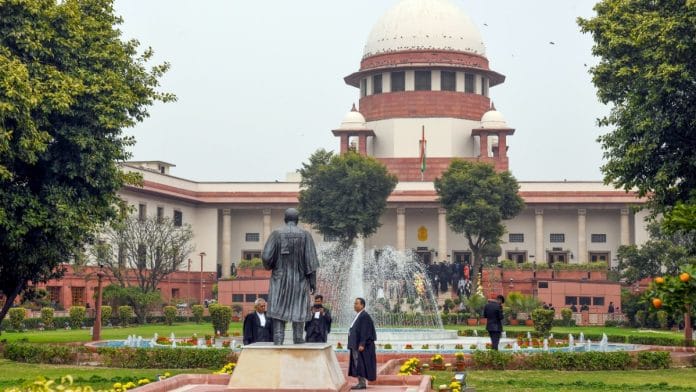New Delhi: The Supreme Court Thursday refused to interfere with the appointment of the two new election commissioners, and also declined to stay the Chief Election Commissioner and Other Election Commissioners (Appointment, Conditions of Service and Term of Office) Act, 2023, which removed the Chief Justice of India from the selection panel appointing election commissioners.
The order was issued by a bench comprising Justices Sanjiv Khanna and Dipankar Datta in open court, while saying that detailed reasons would follow.
During the hearing, the court also remarked that it could not stay the legislation just before the upcoming Lok Sabha elections, as “this will only lead to chaos and uncertainty”. At the same time, the court said the Centre could’ve been more “transparent” with the procedure adopted for the two new appointments.
During the hearing, the bench agreed with the petitioner’s argument that the members of the selection committee should have been given time to examine the names.
The petitioners had said that the 2023 Act was violated when a selection committee member and leader of the opposition of the largest party Congress, Adhir Ranjan Chowdhury, recorded his dissent and questioned the procedure followed.
He told The Indian Express that the government shared with him the names of six shortlisted candidates just “eight to 10 minutes” before the meeting started.
The bench remarked that “this could have easily been avoided by giving two-three days. You should have gone more slowly”. It also commented on the procedure adopted by the selection committee, pointing out that while five names were considered for one vacancy, six were considered for two vacancies.
“This is what appears from the record. They can consider 200 names, but what is the time given? Maybe two hours? 200 names to be considered in two hours? You could have been transparent,” it said. The court, however, rejected the applications for stay of the new appointments.
The court was hearing applications filed by Congress leader Jaya Thakur and the Association for Democratic Reforms (ADR) against the appointment of election commissioners under the Chief Election Commissioner and Other Election Commissioners (Appointment, Conditions of Service and Term of Office) Act, 2023.
The ADR had filed an application on 11 March this year, requesting the Supreme Court that the two election commissioners’ vacancies be filled using the process suggested in the court’s judgement in March 2023, because this new law for their appointment was under challenge before the Supreme Court.
However, Gyanesh Kumar and Sukhbir Singh Sandhu were appointed election commissioners on 14 March, before the application could come up for hearing. They were appointed in accordance with the act.
‘What was the point of the verdict?’
In March last year, a five-judge Constitution Bench had modified the process for appointing members of the Election Commission of India (ECI). The court held that a committee comprising the prime minister, the leader of the Opposition and the Chief Justice of India (CJI) would advise the President on ECI appointments.
However, the Centre passed the Chief Election Commissioner and Other Election Commissioners (Appointment, Conditions of Service and Term of Office) Act, 2023, which took the CJI out of the equation.
According to this act, the chief election commissioner and other election commissioners will be appointed by the President upon the recommendation of a selection committee comprising the PM, a Union cabinet minister, and the leader of the Opposition or leader of the largest opposition party in the Lok Sabha.
Highlighting this change during the hearing, senior advocate Vikas Singh asked the court, “What was the point of this Constitution Bench judgement, then?”
The court, however, emphasised the fact that the judgment spoke of a vacuum in the law to lay down the procedure for appointment of election commissioners. “We cannot say all the other methods of appointment are wrong. We will have to examine… The court never said we are inviting the Parliament to make a law in a particular way,” it said.
Other petitioners also pointed out the alleged haste with which the new appointments were made. However, the court remarked, “Now they have been appointed, elections are around the corner… It is a question of balance of convenience. There are no allegations against persons appointed.”
The court also asserted that prior to the law, election commissioners were appointed by the executive, adding, “From the T.N. Seshan case and even thereafter, election commissioners were appointed by the executive and then upheld by this court.”
(Edited by Tikli Basu)
Also read: ECI shakes up district administration in five states, transfers non-encadred DMs & SPs







The Supreme Court could have required the decision of the Committee to be unanimous. The presence of the LoP is meant to ensure political neutrality and impartiality, the core virtue of the ECI. If decisions are 2. – 1, that purpose is not served.